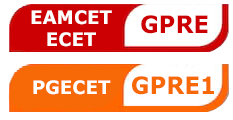The Department of Computer Science and Engineering (CSE) was established in the year 1991. The CSE department started with a modest intake of 30 students in the year 1991, and IT program was started in the year 2000 with an intake of 40. Over the years it has grown by leaps and bounds and presently offers B.Tech in Computer Science and Engineering course with a sanctioned intake of 180 students and B.Tech in Information Technology with a sanctioned intake of 60 students. The department is accredited by the National Board of Accreditation, New Delhi for three years in the year 2004 and re-accredited by National Board of accreditation for three more years in 2007 and IT program was accredited for the first time for three years in the same year. The department also offers a P.G course in Computer Science and Engineering with an intake of 18. The department is recognized as a research centre to offer doctoral program in CSE department.
The department is in thirst of undertaking the research and development activities in emerging thrust areas and introducing new innovative courses based on the industry demands collaborating with national and international institutes, research and development organizations and industries
Vision:
The Department aims to become a leader in the field of education, training and research in Computer Science and Engineering discipline.
Mission:
M1:To strengthen the core competence in Computer Science and Engineering by imparting quality education and training.
M2:To promote innovation and research through collaborative and participatory approaches.
M3:To inculcate the leadership capabilities, ethical values and professional behavior to face the challenges in global market.
PROGRAMME EDUCATIONAL OBJECTIVES (PEOs)
The Program Educational Objectives (PEOs) of the under graduate programme in Computer Science & Engineering at G. Pulla Reddy Engineering College (Autonomous) Kurnool are to prepare graduates to possess the ability to
PEO1. Analyze, Design and Develop computer based systems and applications using core areas of Computer Science & Engineering.
PEO2. Be engineering professionals, innovators or entrepreneurs engaged in their profession with social awareness and ethical values.
PEO3. Work in teams in multi-disciplinary areas to address the needs of society.
PEO4. Adapt to cutting edge technologies by engaging themselves in lifelong learning.
PROGRAM SPECIFIC OUTCOMES (PSOs)
Computer Science & Engineering program students will be able to
PSO1. Understand the principles, structure and development methodologies of system software.
PSO2. Design, develop, implement and test application software for systems including distributed software systems.
PSO3. Understand the architecture and organization of computer systems, embedded systems and networked systems.
PROGRAMME OUTCOMES
Computer Science and Engineering Program Students will be able to
1. Engineering knowledge: Apply the knowledge of mathematics, science, engineering fundamentals, and an engineering specialization to the solution of complex engineering problems.
2. Problem analysis: Identify, formulate, review research literature, and analyze complex engineering problems reaching substantiated conclusions using first principles of mathematics, natural sciences, and engineering sciences.
3. Design/development of solutions: Design solutions for complex engineering problems and design system components or processes that meet the specified needs with appropriate consideration for the public health and safety, and the cultural, societal, and environmental considerations.
4. Conduct investigations of complex problems: Use research-based knowledge and research methods including design of experiments, analysis and interpretation of data, and synthesis of the information to provide valid conclusions.
5. Modern tool usage: Create, select, and apply appropriate techniques, resources, and modern engineering and IT tools including prediction and modeling to complex engineering activities with an understanding of the limitations.
6. The engineer and society: Apply reasoning informed by the contextual knowledge to assess societal, health, safety, legal and cultural issues and the consequent responsibilities relevant to the professional engineering practice.
7. Environment and sustainability: Understand the impact of the professional engineering solutions in societal and environmental contexts, and demonstrate the knowledge of, and need for sustainable development.
8. Ethics: Apply ethical principles and commit to professional ethics and responsibilities and norms of the engineering practice.
9. Individual and team work: Function effectively as an individual, and as a member or leader in diverse teams, and in multidisciplinary settings.
10. Communication: Communicate effectively on complex engineering activities with the engineering community and with society at large, such as, being able to comprehend and write effective reports and design documentation, make effective presentations, and give and receive clear instructions.
11. Project management and finance: Demonstrate knowledge and understanding of the engineering and management principles and apply these to one’s own work, as a member and leader in a team, to manage projects and in multidisciplinary environments.
12. Life-long learning: Recognize the need for, and have the preparation and ability to engage in independent and life-long learning in the broadest context of technological change.





